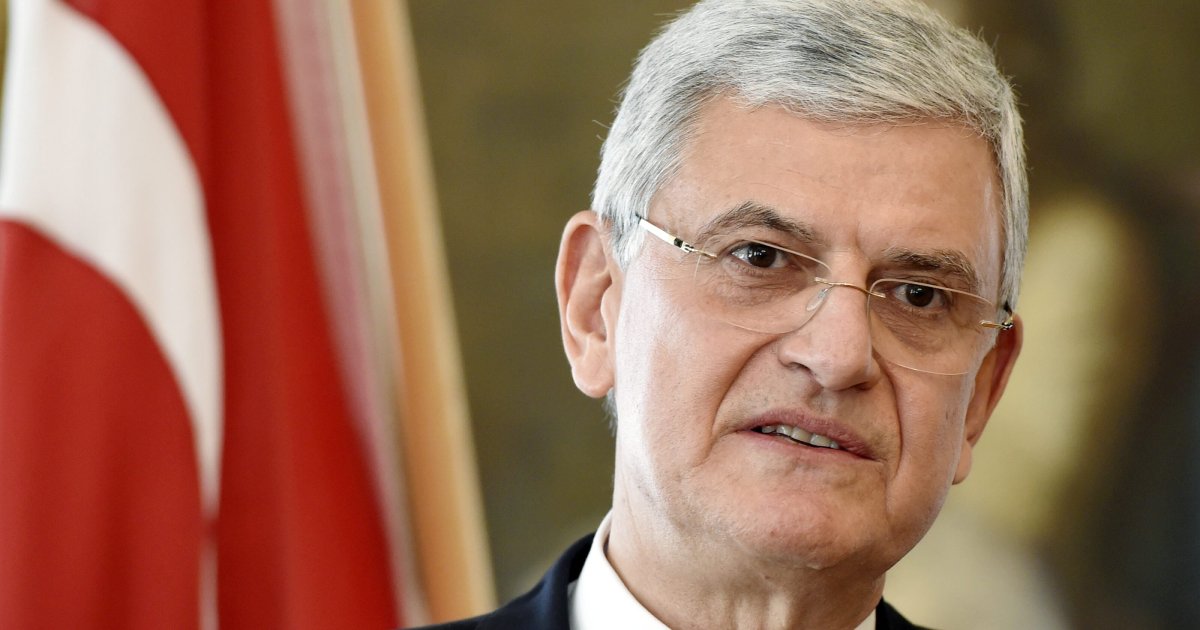
United Nations General Assembly president says the two nations should ‘refrain’ from taking steps that would alter disputed territory’s status.
Islamabad, Pakistan – India and Pakistan should “refrain” from taking steps that would alter the status of the disputed territory of Kashmir, the president of the United Nations General Assembly (UNGA) has said, as the two countries once again traded accusations over the Himalayan region this week.
UNGA president Volkan Bozkir was speaking at a joint news conference with Pakistan’s Foreign Minister Shah Mehmood Qureshi in the Pakistani capital Islamabad on Thursday, as he completed a three-day visit to the Muslim-majority nation.
“Both parties, all parties, must refrain from taking steps that could affect the status of Jammu and Kashmir,” said Bozkir, a former Turkish diplomat and politician who assumed office in September.
“This is I think the very important part of how we look at the case.”
India and Pakistan have fought two of their three full-scale wars since gaining independence in 1947 over Kashmir, which both claim in full but administer separate portions of.
In August 2019, India revoked a special constitutional status accorded to Indian-administered Kashmir in a move Indian Prime Minister Narendra Modi said was aimed at increasing development and bringing the territory into the country’s administrative mainstream.
Pakistan opposed the move, accusing India of attempting to absorb the territory without bilateral resolution of the ongoing dispute.
It has also accused India of attempting to change the demographics of the Muslim-majority territory through a new domicile law, which was passed by Modi’s government last year.
Bozkir did not elaborate on whether his statement was in reference to the 2019 and 2020 actions by the Indian government.
“I must also reiterate that the United Nations’ position on Jammu and Kashmir is governed by the United Nations charter, and applicable Security Council resolutions,” he said.
“India and Pakistan’s Simla Agreement of 1972 which says that the final status of Jammu and Kashmir is to be settled by peaceful means in accordance with the UN Charter.”
Bozkir urged Pakistan to raise the issue of Kashmir at the UN “more strongly” and said a special session could be held on the issue if enough countries petitioned for it.
India, Pakistan trade barbs
On Thursday, Pakistan’s foreign ministry issued a rebuttal to comments made by India’s Foreign Minister Subrahmanyam Jaishankar a day earlier, wherein he accused Islamabad of allowing “infiltration” of pro-independence fighters into Indian-administered Kashmir from the Pakistani portion of the territory.
“The reason for firing [at the de facto border that divides the territory] is infiltration, so if there is no infiltration there’s obviously no reason to fire,” said Jaishankar at a seminar hosted by the Hoover Institution in the United States.
Jaishankar also referred to “cross-border terrorism” as being one of the issues between the two countries.
Pakistan’s foreign ministry “categorically rejected” Jaishankar’s accusations in its statement on Thursday.
“The spokesperson categorically rejected the allegations of any cross-border infiltration and stated that peace and security in the region was threatened on account of India’s brutalisation of Kashmiri people and refusal to resolve the Jammu and Kashmir dispute in accordance with the United Nations Security Council Resolutions, its own pledges to the international community and the Kashmiris,” said the statement.
Ties between India and Pakistan have been virtually frozen since a February 2019 attack on an Indian security forces convoy in the Indian-administered Kashmir town of Pulwama, which killed more than 40 people. India blamed a Pakistan-based armed group for the attack.
The ensuing standoff saw India bomb Pakistani territory, with the Pakistani army conducting retaliatory air attacks on Indian-administered Kashmir.
Tensions cooled after the pilot of an Indian fighter jet which was shot down by Pakistan’s air force was returned to India, but formal ties remained cool.
In February, in a surprise announcement, the militaries of both countries reaffirmed their commitment to a 2003 ceasefire agreement at the Line of Control, which divides Indian-administered and Pakistan-administered Kashmir.
Since then, several senior Pakistani officials, including the country’s powerful army chief, have said Pakistan is seeking to resolve all outstanding bilateral disputes with its neighbours through dialogue.
In April, senior Pakistani sources outlined several specific steps the country expects from India if bilateral dialogue is to resume.
In India, however, the tone of public statements by officials on the question of bilateral talks has been cooler.
“I think it’s important right now if there is thinking along the lines that there needs to be a better relationship with India,” Jaishankar said on Wednesday.
“On our side there has been clarity of thinking, and the clarity of thinking is that we cannot accept terrorism, or we cannot accept that it is in any way legitimate as diplomacy or as any other aspect of statecraft. So let us see, you know where this progresses.
“Obviously everybody hopes for the best.”
Asad Hashim is Al Jazeera’s digital correspondent in Pakistan. He tweets @AsadHashim.








